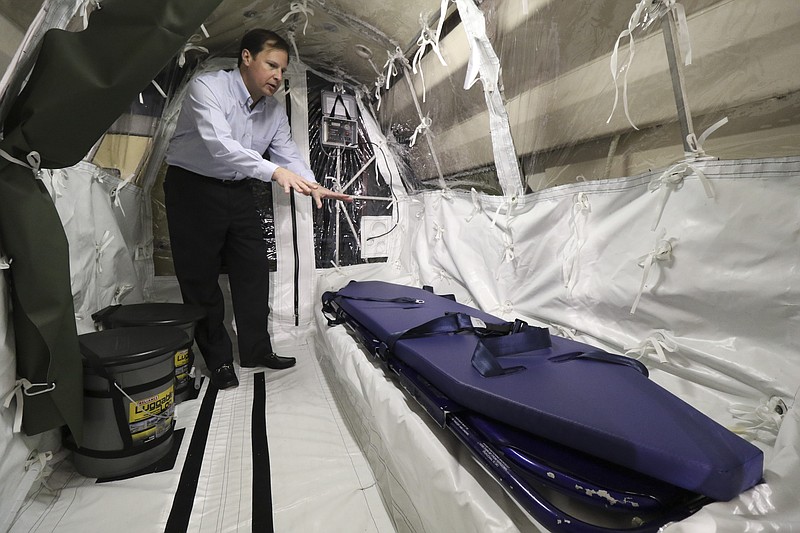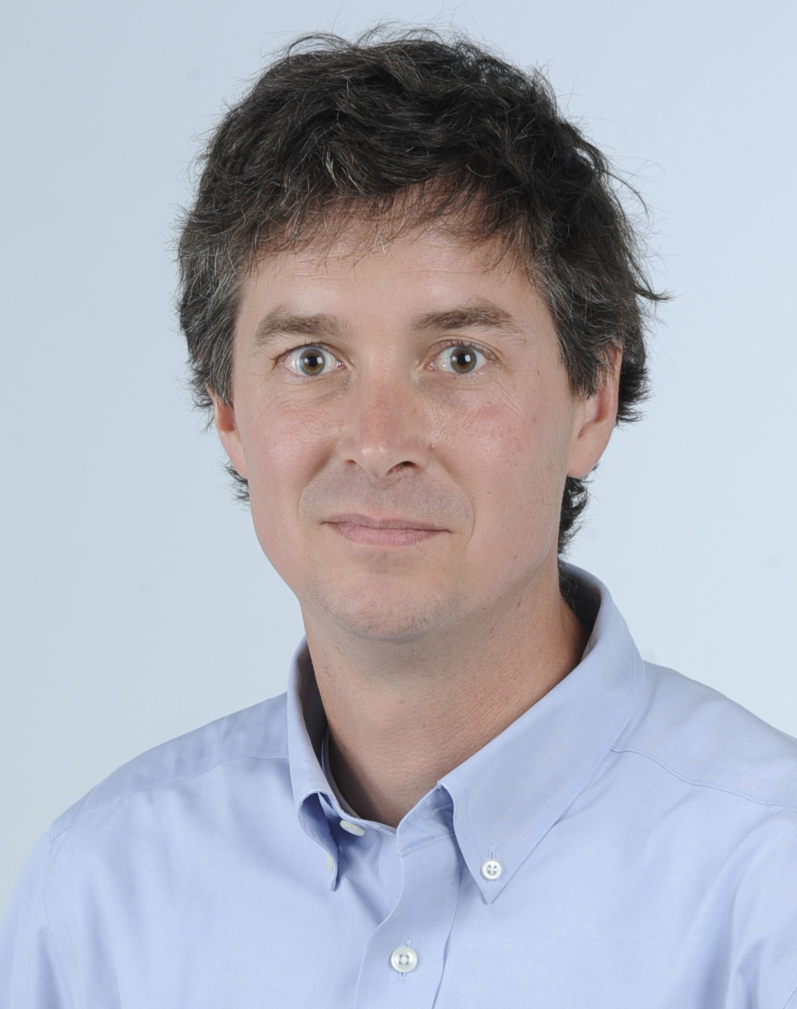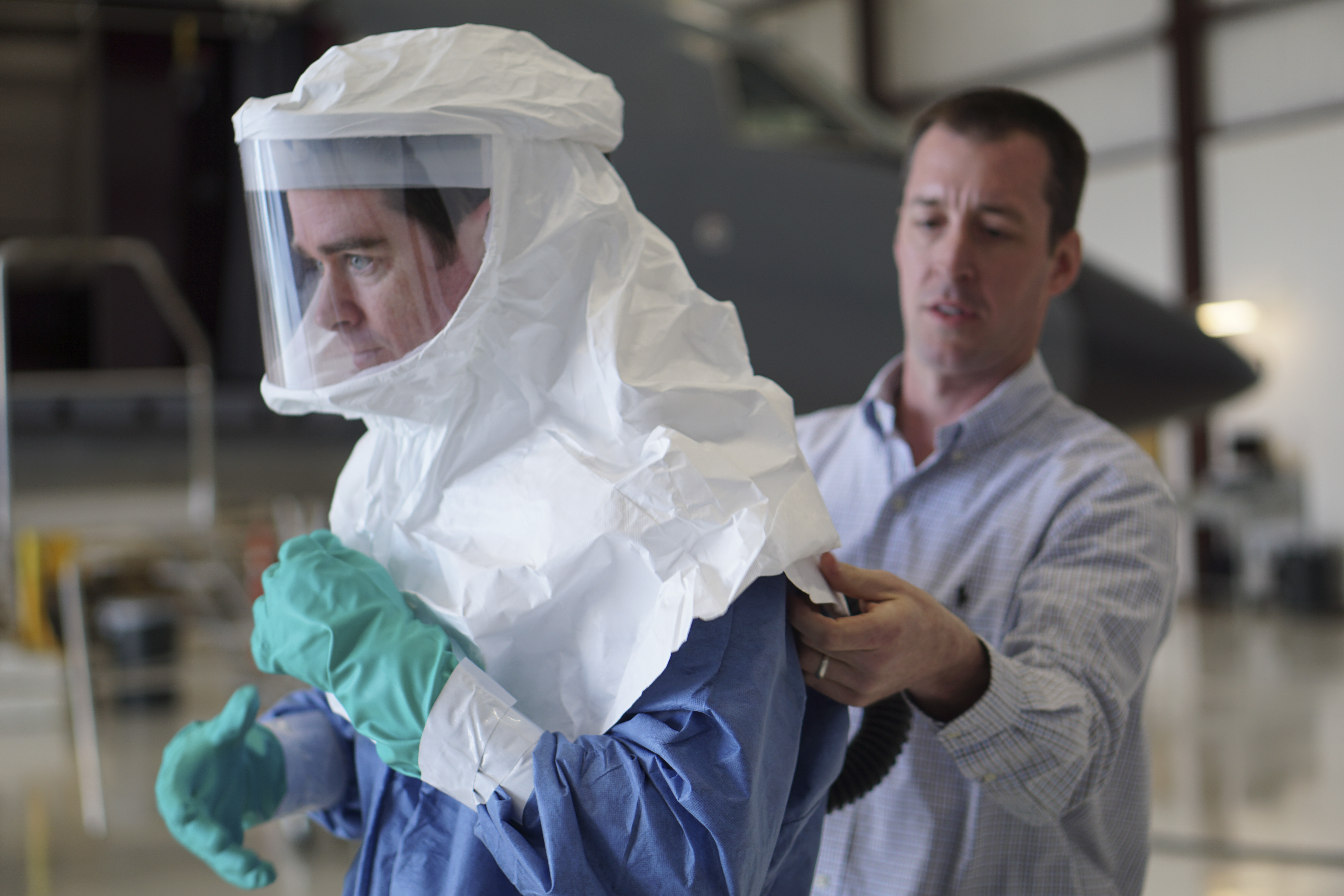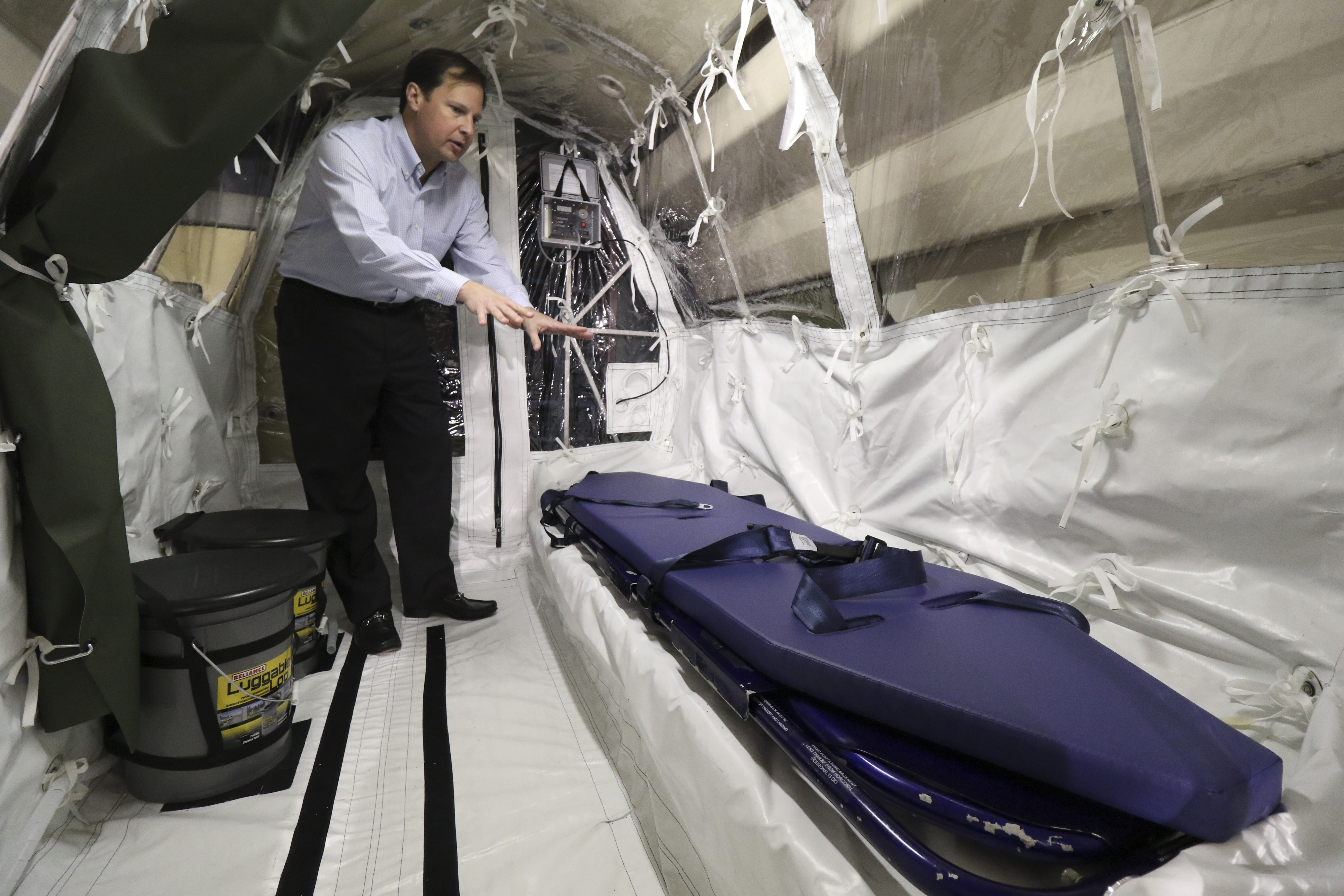Read more
Leave no trace: Chattanooga company on the front lines of Ebola fight Gerson: The next epidemic is likely to be an airborne virus
At a secure, undisclosed airstrip in Georgia, a plane lands.
It's come from west Africa.
It's carrying death.
It's carrying the end of the world.
The jet itself is a featureless, gun-metal gray Gulfstream III, what Wall Street millionaires would fly. Yet no playboy would ever board this plane. Even generals don't get too close.
When it lands, one man is there to meet it.
He's always there.
His name is Clay Wardlaw. He's been in the hangar for hours, waiting with his crew. He left his sleeping family -- wife, daughter and son -- in their Lookout Mountain home, whispering: Got to go. I've got a plane.
At first, people didn't understand. Neighbors kept their distance; some wouldn't even shake his hand.
They were afraid. Most of America was afraid.
Wardlaw knows the fear. The first time he stepped aboard this plane, his heart was beating like it was trying to escape his chest. Sweat pooled in the bottom of his hazmat boots. One of his crew members nearly hyperventilated.
"I played sports my whole life," he said. "And I never sweated like I did that day."
When the plane lands, Wardlaw and his crew attach a hose to the plane's air filter system. Into the rear part of the cabin, they pump hydrogen peroxide that's been heated to more than 200 degrees. The humid vapor soaks the cabin like a greenhouse, but with reverse effect: instead of growing, everything inside is decontaminated and dead.
Then, Wardlaw and his crew suit up. They look half-astronaut, half-firefighter, with moon suits and face masks and oxygen tanks. Their skin is completely covered. Completely.
They step inside.
In his mind, Wardlaw can imagine what it was like on the 12-hour flight from west Africa to America. The steel-nerve pilots. The watchful nurses and doctors. And in the back of the cabin, the patient: feverish, bleeding, delirious.
They're all gone now.
When the cabin door opens, there's only one thing left on board, and Wardlaw's job is to clean it up.
Ebola.
One year ago, the Ebola virus began spreading through west Africa. Health experts believe Patient Zero was a 2-year-old boy in Guinea, who may have been infected from a fruit bat. Within days, his sister, mother and grandmother also died. Then, a health worker. Then, a doctor. There, in a forgotten corner of the world, an epidemic had begun.
The disease stole across borders -- into Sierra Leone, Liberia -- and by the end of summer, the number of new cases was doubling every few weeks. It has become the worst Ebola outbreak in human history, with more than 10,000 dead.
Unlike the flu, Ebola isn't airborne. It spreads as people come into contact with the bodily fluids -- blood, urine, vomit, feces -- of an infected person, and against a backdrop of desperate Third World poverty, pathogen-friendly customs (like burials, where the family touches the body of the deceased) and a nearly nonexistent health care system, west Africa became Ebola's welcome mat.
World health experts predicted more than a million cases in two African nations alone.
America panicked. Senators talked about closing the borders. Headline after headline. What if Ebola reaches India and its billions? What if someone infected boards an international flight? What if that flight lands in Atlanta?
In our minds, it was the end of the world.
Aid organizations and health experts begged for international help. Infected doctors and medical missionaries -- like Dr. Kent Brantly and Nancy Writebol with Samaritan's Purse -- were evacuated from Africa back to American hospitals. First World countries began funding a more organized response.
Then, in August 2014, Wardlaw's cell phone rang.
It was a high-ranking official in the U.S. State Department. He had two questions for Wardlaw.
Could he decontaminate the planes that transported Ebola-infected Americans out of Africa?
More importantly, would he?
Wardlaw didn't hesitate.
"It would be an honor," he said.
For nearly a decade, Wardlaw's company -- SafetyPlus -- has specialized in the decontamination of some really nasty places. Like government labs where scientists study anthrax. Or hospital rooms where MRSA lurks. Or university centers that research infectious diseases, like the plague. Or botulism. Swine flu. Avian flu. HIV.
If it can cause a global pandemic, then Wardlaw's faced it.
"I respect Ebola," he said. "I do not fear it."
In the early years, his company installed fume hoods and biosafety cabinets inside laboratories. That led to becoming an independent certifier for labs, hospitals and research facilities, which led to decontamination work. Wardlaw purchased specialized $90,000 machines -- not much bigger than your Shop-Vac -- that turn liquid hydrogen peroxide into a vapor. (He uses bottles of hydrogen peroxide that are 35 percent pure. The stuff at your drugstore is 3 percent).
SafetyPlus then became niche: offering both certification and hydrogen peroxide decontamination.
And Wardlaw became a family man staring down deadly viruses.
Yes, he still gets nervous.
"Anything airborne," he said. "TB scares the crap out of me."
A Baylor School graduate, Wardlaw, 44, has brown hair and blue eyes. He's an easy kind of guy, somebody you'd play 18 holes with, a guy generous with mulligans. At home, he does the laundry, but not the bathroom.
In other words, he is normal.
Yet he's also completely abnormal: his Twitter feed is full of Ebola news, global corporations request his services, and when he goes to the doctor, they have conversations the rest of us don't.
"When you are told you have to get an anthrax booster, it makes you think a little bit," Wardlaw said.
In America's fight against Ebola, Wardlaw has become a significant figure. Only three American planes are authorized to travel to Africa to transport infected patients back to Europe or the U.S. Since the outbreak began, those planes have taken about 40 trips.
Following that State Department phone call, Wardlaw and his crew have cleaned every one.
"We feel a great deal of honor and pride," he said. "We want to do it."
Today, the number of Ebola cases is falling. Media outlets have forgotten the issue. Experts talk of the possibility of zero new cases, zero deaths.
The world has not ended.
Wardlaw is one reason why.
Wardlaw is one reason why you've forgotten about Ebola.
Ebola is a wicked, violent, horror-film of a virus.
You develop a high fever. A phantasmagorical headache. Your body rocks with fatigue, as if your bones were melting away. Inside, the dam breaks. You urinate, defecate and vomit. You lose blood. Delusional, you may also lose your mind.
If you are blessed enough to work for an agency that will pay for your evacuation out of Africa, then you will ride in the very back of the plane -- in a sick bay wrapped in thick layers of see-through plastic, as if you were quarantined in a large Zip-Loc.
"We can tell when we walk on the plane how sick a patient was," Wardlaw said.
After they soak the sick bay with hydrogen peroxide vapor for more than an hour, Wardlaw and his crew then begin the physical clean-up of all those bodily fluids.
They bag them once. Then, again. A third time. Then, a fourth.
Then, it's all boxed. Then, incinerated.
Then, they start the hydrogen peroxide vapor-soak all over again.
Before exiting the plane, they leave behind a little strip of hard-to-kill bacteria, which is their canary in the coal mine. Tucked inside a hard-to-penetrate Tyvek pouch, it's an indicator. When it's decontaminated, the whole plane is, too.
"If you can kill that, you're guaranteed to kill Ebola," he said.
Later, after the plane is clean, Wardlaw will walk back onboard, quietly, the way you might approach an empty church. He'll make his way to the very back into the sick bay.
It feels like hallowed ground.
In the last eight months, Wardlaw has encountered the worst of Mother Nature alongside the best of human nature. The death toll does not tell the whole story of Ebola. There is something beyond the blood.
"It's about sacrifice," Wardlaw said. "Sacrifice for the greater good."
* Every Ebola plane is staffed by an all-volunteer crew of pilots, medics and nurses who are risking their lives on behalf of others.
* Before a plane lands, Wardlaw sends out a coded text to his staff of 12, asking for three volunteers to help with decontamination. They fight over who gets the honor.
"They text back within minutes," Wardlaw said.
* Wardlaw has been gone from home for months at a time, working non-stop hours. Same with his crew.
"When a plane lands, it takes a toll on our family," he said.
* Ebola is being fought not by shock-and-awe militarism, but a hazmat-boots-on-the-ground compassionate army of nurses, doctors and humanitarian workers.
Sometimes, they get sick.
Sometimes, it kills them.
Other times, they survive, only to do the unthinkable.
"They want to go back and help," said Wardlaw.
Like Dr. Ian Crozier, the third American evacuated out of Africa.
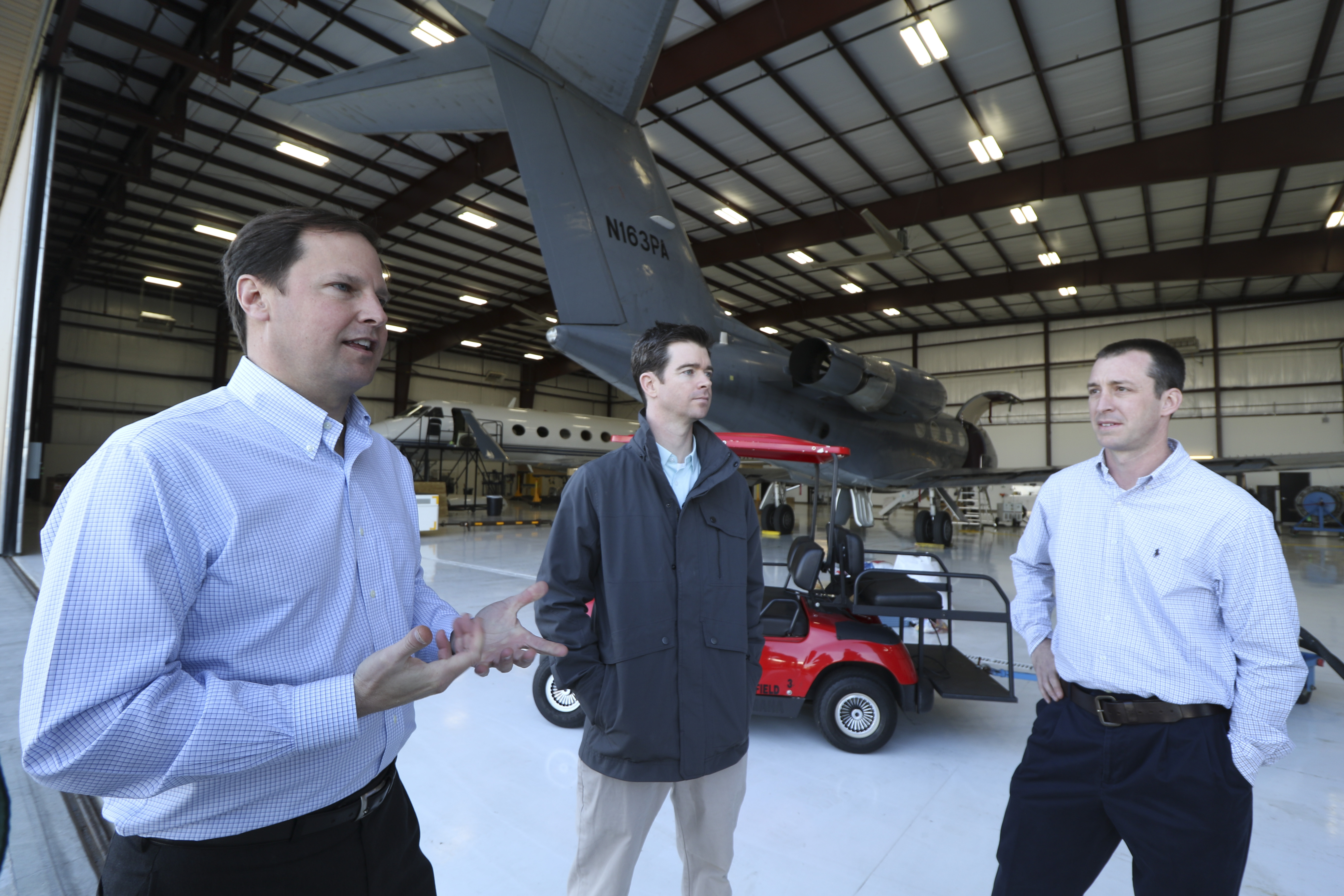 Clay Wardlaw, President/COO of SafetyPlus, left, stands with employees Tommy Hadden, center, and Ryan Reid, right, while explaining the process of decontaminating Phoenix Air Group, Inc.'s Gulfstream III aircraft used to transport Ebola patients to the United States while at the company's high security hanger in an undisclosed Georgia location on March 17, 2015.
Clay Wardlaw, President/COO of SafetyPlus, left, stands with employees Tommy Hadden, center, and Ryan Reid, right, while explaining the process of decontaminating Phoenix Air Group, Inc.'s Gulfstream III aircraft used to transport Ebola patients to the United States while at the company's high security hanger in an undisclosed Georgia location on March 17, 2015. It was September 2014. He was working in a hospital in Sierra Leone when he got infected. Transported to Emory University Hospital in Atlanta, the unconscious Crozier nearly died.
"I developed multi-system organ failure requiring a level of life support that had never been given to an Ebola patient before," he said.
As family and friends prayed for his recovery, so did Wardlaw. As Crozier fought for his health, Wardlaw began reconstructing the pieces of his life. Not only does he decontaminate the planes, Wardlaw also cleans the personal items that patients bring back with them.
Their wedding rings. Pictures of grandkids. Diaries and prayer journals. Research documents. Cell phones.
"I never really expected to see them again," said Crozier.
Miraculously, Crozier lived. One day, Wardlaw walked into his hospital room, and handed Crozier his laptop, cell phone, pictures, documents.
"It was a poignant moment," Crozier said. "We became fast friends."
Soon, Crozier plans on returning to Africa.
"Hopefully back to Sierra Leone," he said.
This winter, instead of letting Ebola come to him, Wardlaw went to it.
In December, he traveled to Liberia, to witness the evacuation of a patient. Riding alongside the doctors and nurses in the very cabin he soon would decontaminate, Wardlaw gained a perspective that no other American has.
Not only has he decontaminated an Ebola plane, he's flown inside one.
Soon after the flight returned, Wardlaw got even closer to Ebola.
"Most people think I'm insane," he said.
Days before Christmas, Wardlaw drove to a high-security medical facility, where doctors were waiting with a special syringe. Wardlaw rolled up his sleeve, offering his left arm -- his skin completely exposed -- to the doctors, and to the world.
As the needle plunged into his vein, Wardlaw began thinking about Kent Brantly. Nancy Writebol. Ian Crozier.
About 10,000 Africans who have died from Ebola.
And all the things that could go wrong: the upcoming rainy season, and the way cases are still sprouting up, and how the virus is mutating, and the possibility of another 10,000 dying before the outbreak ends.
"We are winning the fight," he said. "But just like any fight, it can turn on a dime."
As the syringe emptied, Wardlaw became one of the few Americans fighting Ebola on the most intimate level of all.
"I am part of the Ebola trial vaccine," he said.
They didn't inject him with the virus, but rather an Ebola-faux strain that scientists hope will compel his immune system to produce antibodies needed to fight the real Zaire and Sudan strains of Ebola.
Doctors sample Wardlaw's blood every few weeks. So far, so good. Wardlaw says he's producing antibodies.
Yet no one knows about long-term side effects.
"I feel comfortable with it," he said. "At peace."
It is a peace that passes understanding. Why a man would run headlong into Ebola makes no sense unless we understand this:
The real contagion isn't a deadly virus.
It's selflessness.
It's life.
"It's the least I could do," Wardlaw said. "I look at it as a small sacrifice after watching what this virus has done to so many people and what it will continue to do if we don't have a cure."
Contact David Cook at dcook@timesfreepress.com at 423-757-6329. Follow him on Facebook at DavidCookTFP.
